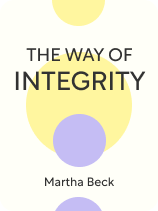

This article is an excerpt from the Shortform book guide to "The Way of Integrity" by Martha Beck. Shortform has the world's best summaries and analyses of books you should be reading.
Like this article? Sign up for a free trial here.
What makes you anxious? What are you avoiding? What do you hate to even think about?
Martha Beck argues that, if you’re not happy, it’s because you’re out of alignment with your true self. To get in alignment, you must discard false beliefs. One way to do this is to move inward toward your brain’s zones of denial. These are the things that make you anxious.
Keep reading to learn about these “forbidden zones” and see why peace is on the other side.
Your Mind’s Forbidden Zones
Beck argues that you can discover your false beliefs by moving inward toward the painful places in your mind where you’re afraid to go. She explains that, when you are living out of alignment with your nature, there are usually regions of your psyche where your conscious mind won’t go—your “forbidden zones.” You don’t yet know what’s in these places, but you know that it is probably painful because of how much you’ve avoided it. What makes you anxious? Those things are likely your mind’s forbidden zones.
As you approach these forbidden zones you may feel overwhelming feelings of dread, pain, sadness, or grief. However, you have a very powerful ally on your side—the yearning of your personal nature. Beck argues that, at your deepest level, you want to live with integrity. This motivation will help you overcome the challenges of entering these terrifying places.
Once you have entered these painful places in your psyche, you will begin to notice the thoughts and beliefs that are causing the pain. You might not realize it yet, but many of these thoughts are actually the false beliefs that you have internalized from your culture. Even if the pain in these forbidden zones is caused by real experiences and events, there may be false beliefs making them even more painful. For example, if your forbidden zone holds the grief of losing a loved one, even though the grief is real, you may feel more pain if you falsely believe that you will never find another person who loves you.
| Why Do People Create Forbidden Zones, and How Do They Impact Us? In her discussion of “forbidden zones,” Beck is referring to a practice that psychologists may call repression or denial. Often people cope with negative aspects of their lives by simply trying to avoid or minimize the negative emotions that they cause. The things that you avoid then become your forbidden zones. In the short run, coping with a problem this way isn’t inherently harmful—you may need time to process and find a solution, and it helps to not feel overwhelmed in the meantime. However, this type of coping becomes maladaptive when you use it as a long-term strategy in place of a solution to the emotional problem. Researchers have found that our coping strategies often develop during childhood. Someone who has experienced unmanageable stress, trauma, or poor treatment as a child may be more likely to fall into a pattern of maladaptive coping. Psychologists also argue that maladaptive coping can cause someone to mute positive emotions as well as negative ones—essentially shutting down the entire emotional system for a flat, neutral experience. Since most people want to experience positive emotions, this validates Beck’s perception that at your deepest level, you don’t really want to cope with your problems this way, even if it feels comfortable in the short term. |
Observe Your Internalized Beliefs
Once you are able to enter your brain’s forbidden zones, you will be in proximity to the beliefs that keep you from alignment. Beck advises you to start by simply observing your painful thoughts and feelings. Get to understand your feelings of discomfort and the kinds of beliefs that might be associated with them.
For example, if you believe that you only deserve love if you have an impressive career, spending some time with this belief can give you insight. When and where did you acquire this belief? How does it make you feel? Once you understand the beliefs that are causing you to live in chronic misery, then you can begin to challenge and overturn those beliefs.
| How to Observe Yourself Beck advises you to observe your own thoughts and feelings. Russ Harris, writing in The Happiness Trap, provides some pointers on how you can do so. Harris conceptualizes the self as existing in two parts: a thinking self and an observing self. Your thinking self narrates your experiences, fantasies, and decisions to yourself—telling a running story about your life. Your observing self simply takes in what you experience without judgment. Harris argues you can shift your attention away from your thinking self to your observing self through mindfulness. Start by observing your senses: What do you see, hear, smell, feel, or taste at this moment? Once you settle into your observing self, you can move your attention to observing the internalized beliefs that make you unhappy. |
Exercise
Beck explains that often we fall out of alignment because we believe things about ourselves and our lives that are simply not true. In this exercise, you’ll have a chance to identify and challenge a belief that might be holding you back.
- Beck argues that we can find our mind’s “forbidden zones” by looking at the topics that make us most anxious. Are there any topics that make you so anxious you avoid thinking about them? Explain what they are, and what about them makes you so anxious.
- Spend some time reflecting on why this topic makes you so anxious. Is there something you believe that is making you anxious? If so, write it down.
- Now that you’ve identified the belief that is making you anxious, ask yourself: Can you be absolutely sure this is true? Explain why or why not.

———End of Preview———
Like what you just read? Read the rest of the world's best book summary and analysis of Martha Beck's "The Way of Integrity" at Shortform.
Here's what you'll find in our full The Way of Integrity summary:
- How to know if you're living in alignment with your true self
- How messages from our culture tell us to chase things we don't really want
- The four stages of realigning your life to find happiness






